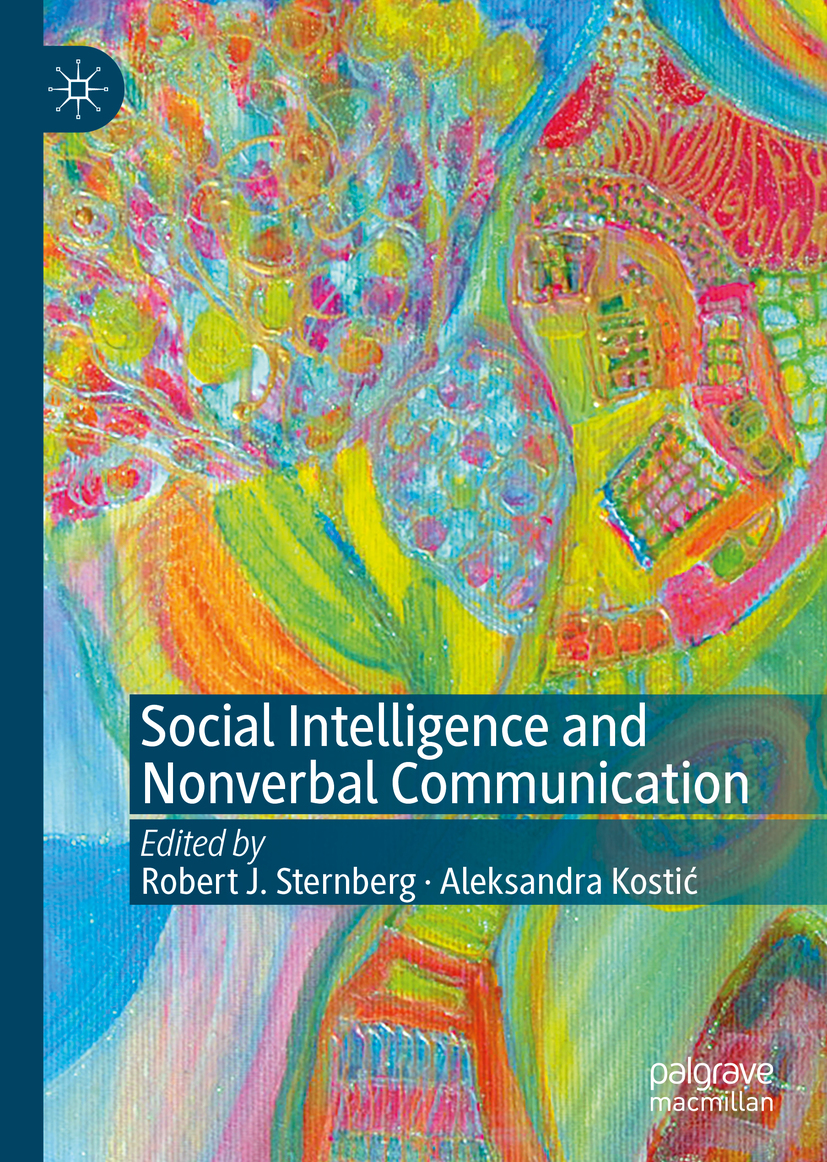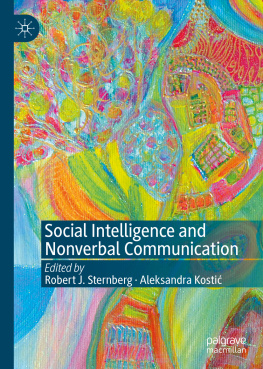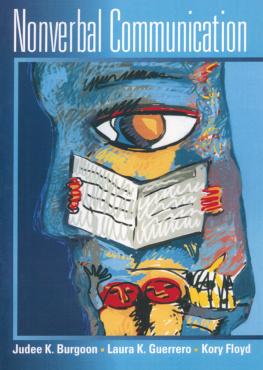Robert J. Sternberg - Social Intelligence and Nonverbal Communication
Here you can read online Robert J. Sternberg - Social Intelligence and Nonverbal Communication full text of the book (entire story) in english for free. Download pdf and epub, get meaning, cover and reviews about this ebook. year: 2020, publisher: Springer International Publishing, genre: Politics. Description of the work, (preface) as well as reviews are available. Best literature library LitArk.com created for fans of good reading and offers a wide selection of genres:
Romance novel
Science fiction
Adventure
Detective
Science
History
Home and family
Prose
Art
Politics
Computer
Non-fiction
Religion
Business
Children
Humor
Choose a favorite category and find really read worthwhile books. Enjoy immersion in the world of imagination, feel the emotions of the characters or learn something new for yourself, make an fascinating discovery.
- Book:Social Intelligence and Nonverbal Communication
- Author:
- Publisher:Springer International Publishing
- Genre:
- Year:2020
- Rating:4 / 5
- Favourites:Add to favourites
- Your mark:
- 80
- 1
- 2
- 3
- 4
- 5
Social Intelligence and Nonverbal Communication: summary, description and annotation
We offer to read an annotation, description, summary or preface (depends on what the author of the book "Social Intelligence and Nonverbal Communication" wrote himself). If you haven't found the necessary information about the book — write in the comments, we will try to find it.
Robert J. Sternberg: author's other books
Who wrote Social Intelligence and Nonverbal Communication? Find out the surname, the name of the author of the book and a list of all author's works by series.
Social Intelligence and Nonverbal Communication — read online for free the complete book (whole text) full work
Below is the text of the book, divided by pages. System saving the place of the last page read, allows you to conveniently read the book "Social Intelligence and Nonverbal Communication" online for free, without having to search again every time where you left off. Put a bookmark, and you can go to the page where you finished reading at any time.
Font size:
Interval:
Bookmark:


Cover illustration: Aleksandra Kosti
This Palgrave Macmillan imprint is published by the registered company Springer Nature Switzerland AG.
The registered company address is: Gewerbestrasse 11, 6330 Cham, Switzerland
Robert J. Sternberg and Aleksandra Kosti have come up with the right book at the right time. Social intelligence is comprised of a wide range of abilities, but the foundation of them all is nonverbal processing skill. They have gathered the leading researchers from different fields of study to present what is known about what has become an increasingly important area. I applaud this effort and recommend it to anyone with an interest in the origins and applications of nonverbal communication ability.
Stephen Nowicki Jr.
Developing social intelligence is crucial to effective functioning in virtually all arenas of our daily life. As this book notes, nonverbal behavior plays a central role in that process. This book is a must have resource for anyone seeking a greater understanding how we accurately (and inaccurately) send and receive messages. The content is especially appealing to scholars and students in Psychology and Communication. The editors have brought together a remarkable cast of distinguished international scholars, who clearly report the most recent research on a variety of fascinating topics ranging from the evolutionary roots of social intelligence to human-machine interaction.
Mark L. Knapp,Jesse H. Jones Centennial Professor Emeritus and University of Texas Distinguished Teaching Professor Emeritus
I am pleased to be able to recommend wholeheartedly a new compendium of research and theory on the non-verbal communication dimension of social intelligence. Editors Robert Sternberg and Aleksandra Kosti head a team of more than a dozen leading researchers offering an interdisciplinary approach that covers many domains of psychology. They highlight both the real-world implications for understanding much of human behavior, as well as offering us a better understanding of social media and political communication.
Social Intelligence: The Adaptive Advantages of Nonverbal Communicationis essential reading for both academics and laypersons wishing to have a clearer and more profound understanding of modern society as a whole.
Philip Zimbardo, Ph.D.,Emeritus Professor of Psychology, Stanford University, author of the bestseller, The Lucifer Effect
This book on peoples wisdom in using and understanding nonverbal communication marks a new level of maturity in the nonverbal field. First we figured out how to measure such ability, then we asked about its correlates, and finally we are asking what its actually good for. Kudos to the field and to these talented authors!
Judith Hall,University Distinguished Professor of Psychology, Northeastern University, USA
The study of intelligence has a long and somewhat checkered past. There are many reasons for this mixed background but, almost certainly, one is that people can be intelligent, in a conventional sense, and lack much (and sometimes, seemingly any) social, practical, or emotional skills (Sternberg, 2003). The so-called intelligent person may do well on a conventional intelligence test but fare only poorly in his or her ability to adapt to the environment, which, from a Darwinian point of view, is essential to intelligence. Indeed, historically, intelligence has been defined at least in part in terms of the ability to adapt to the environment (e.g., Sternberg & Detterman, 1986).
Recognizing the limitations of conventional conceptions of intelligence, some researchers have sought to expand conceptions of intelligence better to reflect the importance of various noncognitive skills that are critical for adaptation to the environment. One such set of skillsarguably, one of the most important setsis to be found in what has come to be called social intelligence.Socialintelligence is the ability to understand, flexibly manage, and, sometimes, control interactions with other people (see various definitions in Albrecht, 2009; Goleman, 2007; Kihlstrom & Cantor, 2011, in press; see also Barnes & Sternberg, 1989; Sternberg & Smith, 1985).
The concept of social intelligence appears to date back to Dewey (1909), but it was popularized by Thorndike (1920). Different taxonomies of social intelligence have been proposed. But one simple one is between verbal and nonverbal social intelligence , whereby verbal social intelligence pertains to interactions of a verbal natureorally or in writingand nonverbal social intelligence pertains to interactions that are or a nonverbal nature, such as eye contact, gesture, facial expressions , bodily form and contact, and so forth. Nonverbal social intelligence is important in many domainsin job interviews, in giving presentations, in intimate relationships or attempts to establish intimate relationships, in inferring friendly or hostile intent, and in conveying messages of approval or disapproval, among other things. Sometimes, nonverbal communication supports verbal communication, but other times, it directly contradicts it. People who are high in social intelligence need to learn to use nonverbal cues to discern whether, for example, what they are hearing corresponds to what a speaker actually thinks or feels. As all of us know, sometimes people say one thing and nonverbally leak another so that nonverbal communication becomes our primary means for detecting deception.
Font size:
Interval:
Bookmark:
Similar books «Social Intelligence and Nonverbal Communication»
Look at similar books to Social Intelligence and Nonverbal Communication. We have selected literature similar in name and meaning in the hope of providing readers with more options to find new, interesting, not yet read works.
Discussion, reviews of the book Social Intelligence and Nonverbal Communication and just readers' own opinions. Leave your comments, write what you think about the work, its meaning or the main characters. Specify what exactly you liked and what you didn't like, and why you think so.












